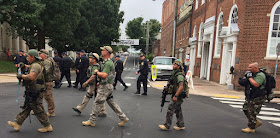 |
| Citizen militia march in Charlotttesville, August 12. EPA/Virginia State Police |
Charlottesville, Virginia is home to the University of Virginia, founded by Thomas Jefferson; he was a slave owner, but today stands as a symbol of the US’s egalitarian ethos and political myth. But on August 12, some seven months into Donald Trump’s presidency, Charlottesville saw a far uglier side of the US on display: a Unite the Right rally bringing together people and organisations who resented the proposed removal of a statue of Confederate Civil War general, Robert E Lee.
On the eve of the rally, the university’s Charlottesville campus became the site of a march of torch-bearing white supremacists, evoking the Klan rallies seen throughout the 20th century. Tense clashes between marchers and counter-protesters ensued, and the next day, the rally itself turned violent.
Radical right marchers turned up along with citizen militia groups (their guns on full display thanks to open carry legislation) and clashed with anti-fascist and other groups who stood up to them. Then 20-year-old James Alex Fields Jr ploughed his car into a group of protesters, and has now been charged with the second degree murder of Heather Heyer, who died after he ran into her.
Much of this violence was social and political. The Civil War has been seen as the true American revolution; it pitted a social and political order based on rugged individualistic capitalism against one of plantation economics and strong social hierarchy, including the system of slavery. The southern model was defeated, the slaves emancipated, and Confederate leaders and sympathisers left to mourn their project as a “lost cause”. But the culture of white supremacy was far from defeated, and radical right-wing social movements and organisations have troubled the US ever since.
The most notorious group, the Ku Klux Klan, was borne of Southern Democrats’ resentment of emancipation; over the years, it has been invigorated by other radical right groups founded on a powerful ideology of “Christian Identity”, a commitment to the racial superiority of white people and a mission to secure white power and dominance. (The Southern Poverty Law Centre has spent decades documenting and mapping their prevalence, discourses and actions across the US.)
To this day, there are strong social elements in the south and elsewhere that resent the the outcome of the Civil War and the consequences of reconstruction. To them, those consequences include the enfranchisement of women, the Civil Rights movement, Supreme Court rulings such as Brown v Board of Education (which desegregated schools in 1954) and Roe v Wade (which legalised abortion in 1973), and the overall advance of a progressive social agenda – one that to them culminated in the election and presidency of Barack Obama.
This politics of resentment gathered steam during the Trump campaign, and as the events in Charlottesville demonstrate, it’s now flourishing under his presidency.
Fanning the flames
During the 2016 campaign, Trump’s rhetoric was caustic and divisive. He described differences between groups as if they were essential and irreduceable; he named Mexicans and Muslims as having special attributes, lesser qualities, and who were in need of special measures, such as a “complete shutdown” on Muslims entering the US and a 2,000-mile border wall to keep out Mexican “rapists and murderers”.
His rhetoric also legitimised interpersonal violence more generally. He boasted that he could shoot someone and not lose votes, and encouraged participants at his rallies to use physical force against dissenters.
Trump failed to name the right-wing violence as white supremacy, or to specifically condemn it; instead, he lamented the violence on all sides. The job of denouncing white supremacist racism was left to his daughter Ivanka and his vice-president, Mike Pence, who used much stronger language. After something of an outcry at his vague words, he finally took to Twitter to rail against “all that hate stands for”.
Many asked why Trump did not unequivocally condemn the events. But to explicitly condemn these groups would alienate a significant portion of his electoral base – something specifically pointed out to him by former Klan leader David Duke.
The protesters in Virginia, who came from across the US, closely resemble many who attended Trump rallies during the campaign – and much as he did post-Charlottesville, when asked by a journalist to specifically condemn the violence at those events, Trump declined.
While many of grievances Trump issued during the campaign are legitimate – the decline of the manufacturing, steel, and coal industries, decaying infrastructure, and so on – the rhetorical framing of the campaign galvanised a right-wing populism that had been in abeyance for much of the 1990s and early 2000s. In mid-2017, this dark side of populism is clearly very much awake.
About Today's Contributor:
Todd Landman, Professor of Political Science, Pro Vice Chancellor of the Social Sciences, University of Nottingham
This article was originally published on The Conversation.
